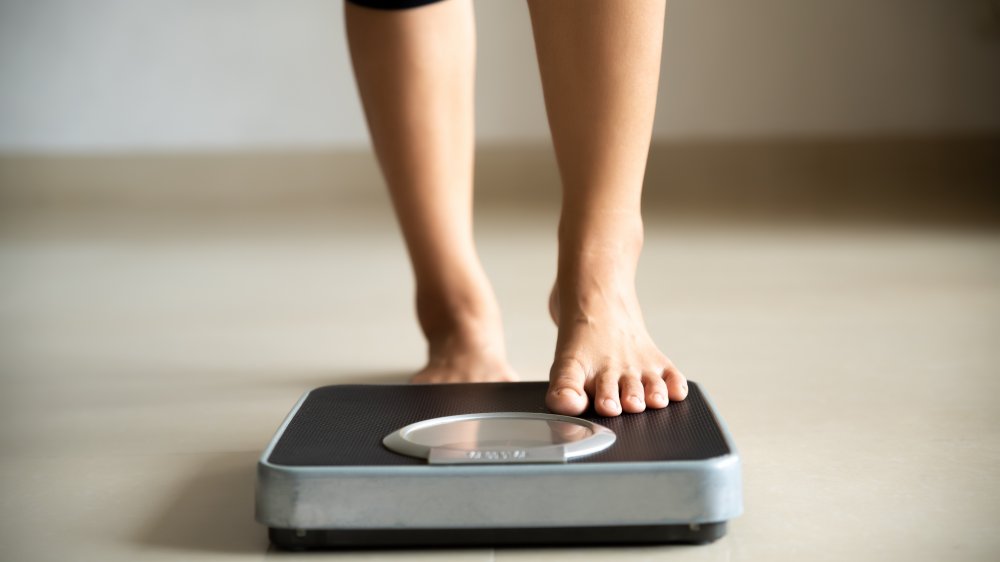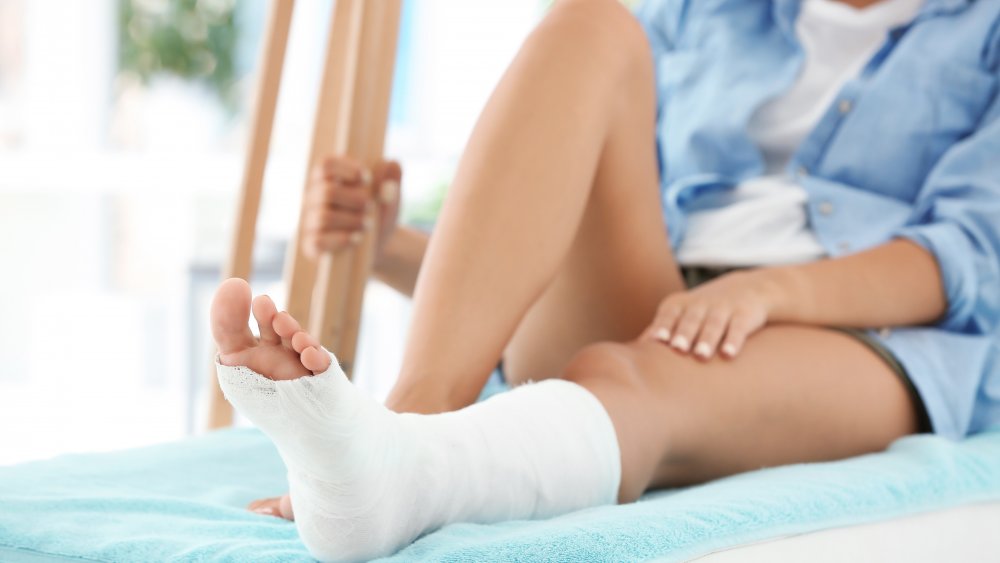This Is What Happens When You Work Out Too Much
Regular workouts are, naturally, good for your health. As the University of Michigan's Health Service points out, the benefits of a regular exercise program include everything from reduction in stress, anxiety, tension, fatigue and depression to weight maintenance to improved self esteem. However, too much of any good thing can be the opposite of good — and this is especially true when it comes to exercise.
As fitness culture increasingly dominates our social feeds, there's growing pressure (whether real or perceived) to work out more often and more intensely than is actually advantageous to our bodies, personal trainer Corey Berger pointed out to Health Digest.
The result? We're seeing more and more people overexercising (aka overtraining), which Berger defined as working out so often and/or so intensely that the body does not have the chance to recover in between workouts. The result is, in a word, stress. And that stress plays out on one's body, mind, and emotional well-being. Here's a look at what could happen if you work out too much.
When you work out too much, you risk becoming dehydrated
The problem with thirst is that we don't actually feel it until were way past thirsty. In fact, we only start to feel thirsty when we are already technically dehydrated, which means that the body has lost more water than has been replaced. According to the Merck Manual, adults should drink at least six glasses of fluids per day. However, that intake should be increased in the event of prolonged exercise. Our body's need for water also increases in hot weather, when our own temperature is elevated, and when we're following an eating plan that discourages the eating of fruits, such as the keto diet.
It's normal to be thirsty after a workout, but if you're working out excessively and not drinking enough, especially if you're following the keto diet, it could lead to a chronic state of dehydration, certified personal trainer Carol Michaels told Health Digest. Chronic dehydration can harm the kidneys and lead to other problems like hypertension and even dementia.
You could get injured if you work out too much
Working out too often, too intensely, or with too much emphasis on one muscle group is a set-up for physical injury, which can happen in various ways, according to physical therapist Heather Jeffcoat. For example, there's acute injury, such as a sudden muscle tear while exercising. Acute injuries can happen for any number of reasons that relate to overtraining, including fatigue. There is also cumulative injury, which occurs over time as a result of repetition. An example is a stress fracture, which is a small break in a bone (oftentimes the foot) that results from the application of repetitive force.
Training certain muscle groups to the exclusion of others can increase your risk for both cumulative and acute injuries. Among Jeffcoat's patients that work out too much, tendinitis is common. Tendinitis is an inflammation of the tissue connecting muscle to bone. It's a classic sign of doing "too much too soon," Jeffcoat told Health Digest, which is to say exercising more than your own body can handle at any given time.
Working out too much could prevent results
Ironically, when you work out too much, you risk seeing your returns diminish over time, certified personal trainer Anna Em told Health Digest. In the short term, overtraining can lead to persistent muscle soreness and fatigue. In some cases, it can even lead even to "adrenal insufficiency," a hormonal condition associated with fatigue and muscle weakness, among other symptoms. In either case, the quality of the workout diminishes until the body is finally rewarded with some much deserved rest.
Overtraining can be counterproductive in the long term as well. Em noted that overtraining often leads to a period of days, weeks, or even months during which it becomes seemingly impossible to muster the strength to even show up for a workout, let alone perform at the level needed to continue to see gains.
The result is, at best, a plateau. More likely, there will be some degree of loss of results previously gained. What follows is often an overzealous return to exercise following an all-too-brief rest. Unfortunately, the markers for overtraining appear only after the damage has already been done, which means the best way to avoid it is to ensure you give yourself adequate rest and time to recover between workouts.
You might gain weight if you work out too much
Working out too much, or overtraining, can lead to weight gain, CrossFit trainer Wendy Shafranski told Health Digest. And as you might have guessed, it's all about hormones. On the one hand, exercising too much can cause the body to produce insufficient hormones to continue supporting an effective muscle-building workout. On the other hand, exercising too much can also lead to an overproduction of the hormone cortisol.
Cortisol plays an important role in helping the body adapt to stress. One way that it does that is by causing you to crave more energy (presumably for the purpose of coping with all the stress). And what is energy? Calories. So, when we overexercise, we are stressing our bodies. The increased stress raises cortisol levels. As a result, we may begin to crave high-calorie foods. Hello, stress eating and hello, weight gain!
Working out too much could hurt your brain
It is well-established that getting regular exercise is good for your brain — including your memory function and ability to learn. Regular exercise has even been associated with a reduction in the risk of Alzheimer's disease. But that's moderate exercise we're talking about. Exercising too much, by contrast, can be harmful to brain function, including both memory and learning.
In a 2019 study published in the Journal of Physiological Sciences, scientists observed that rats who were subjected to "overtraining" exercise conditions suffered learning and memory impairment compared to rats subjected only to "moderate" exercise conditions.
But what about humans? In another 2019 study, this one published in the journal Current Biology, scientists induced overtraining in a group of endurance athletes and then tested their cognitive function while conducting fMRIs of their brains actually functioning. What the scientists found is that overtraining led to more impulsive decision-making, which they attributed to "cognitive fatigue" caused by overtraining.
You could experience mood swings if you work out too much
Overtraining, or working out too much, can do a number on your emotional well-being, according to CrossFit trainer Wendy Shafranski. According to Shafranksi, hormones are to blame, in this case both cortisol and epinephrine. Epinephrine plays an important role in driving your "fight or flight" impulse, and that can make you feel on edge, to say the least.
The body's production of both cortisol and epinephrine increase in response to stress. Exercising so much and/or so intensely that you never give your body a chance to recover from the effort causes physical strain, which is to say: stress. In addition to causing cravings that can lead to weight gain, higher levels of cortisol can cause mood swings and irritability. Both cortisol and epinephrine can also lead to insomnia or restless sleep, either of which can exacerbate mood swings and irritability. Other emotional symptoms associated with overtraining include depression and a loss of motivation.
Working out too much could lead to body dysmorphia
Even if your habit of exercising too much is not actually causing you to gain weight or lose your hard-won results, it could cause you to think that you are, certified personal trainer and health consultant Michelle Houston told Health Digest. While virtually everyone is at least somewhat bothered by some physical imperfection (and let's face it, we all have them), people who develop body dysmorphic disorder (BDD) become fixated on perceived flaws, according to the Cleveland Clinic.
This disorder can be caused by a number of factors, including biological, neurological, and environmental. That means that some people are more prone to BDD than others. Although working out is a healthy activity, those with BDD may begin working out excessively — and it can be debilitating. Those with BDD often take drastic measures to try to "fix" their imagined flaws by ramping up their exercise routine, dangerously restricting their eating, or repeatedly undergoing cosmetic surgeries.
Working out too much and eating disorders often go hand in hand
For anyone who has an underlying predisposition toward disordered eating, working out too much can act as the tipping point in terms of developing a full-blown eating disorder. "Continuously working towards some impossible physical ideal can lead some people to become increasingly dissatisfied with their appearance or exacerbate already-existing feelings of dissatisfaction," certified personal trainer and health consultant Michelle Houston pointed out to Health Digest. "The resulting feelings of guilt and shame can lead to an urge to punish oneself." And that self-punishment can take the form of extreme dieting, increasingly extreme exercising, or some combination of both. In addition, depression can go along with working out too much, and it's often associated with eating disorders.
If you are struggling with an eating disorder, or know someone who is, help is available. Visit the National Eating Disorders Association (NEDA) website or contact NEDA's Live Helpline at 1-800-931-2237. You can also receive 24/7 Crisis Support via text (text NEDA to 741741).
Your periods could become irregular if you work out too much
One way a woman might know that she has been working out too much is if her periods become irregular or cease altogether (a condition known as amenorrhea), certified personal trainer and nutritionist Matt Wismer told Health Digest. That being said, it would be unusual for a woman to experience amenorrhea from excessive exercise alone. Instead, amenorrhea is more commonly seen in women who are both exercising excessively and restricting their eating to the point where they are at a low body weight relative to their frame (this doesn't necessarily mean that the woman has an eating disorder, although it could).
The combination of intense exercise and low body weight makes the body believe it is in a starvation state, USC Fertility explained. In response, the body begins conserving energy any way it can, including pausing organ systems that are not absolutely essential for survival. One of those organ systems is the reproductive system. Some medical experts believe that the stress hormone cortisol also plays a role in pausing the reproductive system. Infertility may result, but it can be treated with medications. However, USC Fertility explained that "optimizing body weight by improving nutritional intake before trying to get pregnant is the preferred approach."
When you work out too much, you risk developing premature osteoporosis
Infertility is just one of the problems that comes with exercise-induced amenorrhea. When the female body's reproductive system essentially goes on furlough, the production of estrogen vastly diminishes. Lower estrogen levels can lead to osteoporosis, a bone disease involving loss of bone density such that the bones actually appear porous when viewed under a microscope. Porous bones are weak and prone to breakage. In advanced cases of osteoporosis, bones may break from something as minor as a cough.
Osteoporosis is relatively rare in women under the age of 50, but when it is seen, it tends to be one-third of what certified personal trainer and nutritionist Matt Wismer and medical experts refer to as the "female athlete triad" (the other two-thirds consist of exercise-induced amenorrhea and disordered eating). Something else that goes along with the triad is an increased risk of heart attack later in life (as a result of long-term estrogen deficiency).
You could lower your sperm count by working out too much
About 9 percent of American men experience fertility problems, according to the U.S. Department of Health and Human Services. Most "male factor" infertility is due to a problem with the quality or volume of sperm. There are a number of reasons why these issues can occur, but one you may not have imagined has to do with exercise — specifically overexercise.
While scientists have long suspected this, a 2017 review of the existing literature on the effects of intense physical activity on male fertility confirm that working out often and at high intensity can impair male fertility by lowering sperm count, reducing the speed at which sperm is able to move, and reducing the number of sperm that are healthy and functioning. By contrast, the literature also reflected that moderate exercise can have a positive effect on semen quality and quantity.
Working out too much could kill your libido
While moderate exercise has been shown to provide a nice boost to the male drive (by increasing testosterone levels), and while it has also been demonstrated that being overweight and sedentary may be tied to a lower libido in men, it seems that, once again, it's a case of "everything in moderation."
A 2017 study out of the University of North Carolina at Chapel Hill consists of an analysis of existing data culled from a survey of 1,077 healthy men regarding their exercise habits and libido. When reviewing the data, the experts found that men who routinely take part in long or highly intense workouts were less likely to report a normal libido than their peers who exercise more moderately.
Or to put it another way, it appears that going long and hard at the gym may lead to precisely the opposite in the bedroom. How? Dr. Joan Khoo, a researcher at Changi General Hospital in Singapore explained to Reuters, saying, "Over-training suppresses production of testosterone and other hormones which stimulate libido and sperm production in men, in a similar way to how high levels of intensive exercise training suppresses estrogen production, menstrual cycles and fertility in women."
Working out too much can mess with your hair, nails, and skin
While amping up your workouts can often do wonders for your hips, thighs, and abs, it can also do terrible things to your hair, skin, and nails, according to sports chiropractor and certified strength and conditioning specialist Alex Tauberg. The culprit appears to be hormones, and once again, the stress-hormone cortisol comes into play. As Tauberg explained to Health Digest, high levels of cortisol can wreak havoc on the hair, skin and nails.
Under the influence of higher levels of cortisol, the hair can become dry and brittle. Even worse, stress is also associated with hair loss. High levels of cortisol can cause acne — even in those who are not normally prone to acne, dermatologist Flor A. Mayoral revealed in a speech at the American Academy of Dermatology's SKIN Academy (via ScienceDaily). And excess cortisol can cause the nails to become brittle and more prone to breakage and peeling.
You could develop this rare but terrifying condition from working out too much
One of the scariest side effects of working out too much is a life-threatening condition called rhabdomyolysis. Rhabdomyolysis is, thankfully, relatively rare; just 26,000 people develop it each year. It involves a breakdown of muscle tissue, causing the release of a toxic protein into the bloodstream. The protein, myoglobin, can cause serious damage to the kidneys, which is why one of the symptoms is a distinctive dark reddish or tea-colored urine.
Rhabdomyolysis can be caused by any form of muscle damage, but it's most commonly associated with overexertion, particularly in extreme heat, which causes the muscles to break down even more rapidly. Rhabdomyolysis can be exacerbated by dehydration, which is also associated with working out too much. It's seen primarily in endurance athletes, members of the military, and firefighters. However, others can be susceptible, including the elderly who fall, are unable to get up, and are not discovered for an extended period of time.















